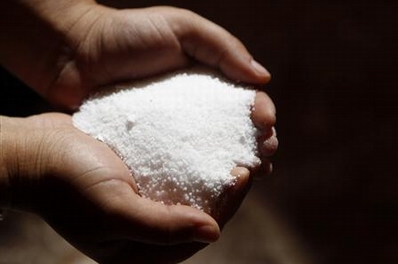
Belarus this week detained the chief executive of Russia's Uralkali (URKA.MM), the world's top potash producer, accusing him of inflicting severe economic damage.
Moscow demanded the release of CEO Vladislav Baumgertner. Uralkali controls 20 percent of the world market and is partially owned by Suleiman Kerimov, a billionaire with close ties to Russian President Vladimir Putin's administration.
"We are very concerned as to how things will develop next. Chinese firms must have suspended signing any deals before the situation becomes clear," said a Chinese industry source familiar with the strategies of potash buyers.
The detention is an escalation of a dispute between Uralkali and state-owned Belaruskali that has led to the breakup of trade partnership Belarusian Potash Company (BPC). Some key importers are now thinking about suspending purchasing talks until the matter is clarified and it becomes clearer where potash prices are headed.
Belarus also put four managers from Uralkali on Interpol's wanted list, including sales head Oleg Petrov. It remains unclear whether he can travel for talks to China or India, two of the world's biggest users of the crop nutrient.
Cutthroat Competition
The market for potash has long been dominated by a handful of players, led by BPC and its rival Canpotex, which groups North America's Potash Corp of Saskatchewan Inc (POT.TO), Agrium Inc (AGU.TO) and Mosaic Co (MOS.N).
Angered by a law passed in Belarus last year allowing Belaruskali to make sales outside the marketing venture, Uralkali quit the cartel on July 30, saying it would seek to maximize its own volumes. It warned that prices could fall as much as 25 percent this year to less than $300 per tonne.
The breakup could be a major hit to Belarus, which generates over a tenth of its budget revenues from potash exports. A threat by Belarus to hold Baumgertner for at least two months suggests there is little hope of a reconciliation.
"The way developments are happening, it is adding to bitterness," said a senior official with a leading Indian potash importer. "I don't think Uralkali and Belaruskali can come together again. It is (certain) there would be cutthroat competition among suppliers, which is good for buyers,"
China imports about half of the 10-11 million tonnes of potash it uses each year. Potash use in India, which relies on imports, has almost halved to 3.5 million due to rising prices.
Stocks in India are ample and there is no need for Indian buyers to rush into new deals until there is more clarity on prices, said an official with Rashtriya Chemicals and Fertilizers Ltd (RSTC.NS), who was not authorized to speak publicly.
One North American producer also says buyers are in a waiting mood.
"While the Russian-Belarusian statements and recent actions have created uncertainty in the potash market, it is business as usual, although I think it's fair to say buyers are only buying what they need," said Richard Downey, spokesman for Canadian potash producer Agrium.
That hesitation could pose problems this autumn.
U.S. farmers typically apply fertilizer after the harvest to prepare the land for planting in spring.
But with talk of a steep fall in potash prices, farmers might wait until spring to buy fertilizer, said Joe Dillier, director of plant food for Growmark, a network of U.S. agricultural co-operatives that sell field-ready fertilizer to farmers.
Retail fertilizer dealers are already storing stockpiles that are smaller than usual, and the uncertainty might make them even more hesitant to buy the crop nutrient, Dillier said.
That thinking could backfire and leave them with a shortage if U.S. farmers get favorable weather in October and November and decide to apply fertilizer.
"It does complicate things all the way through," Dillier said. "It's a crazy time in fertilizer in general and particularly in potash."
The dispute between Russia and Belarus has not prevented Growmark from buying potash from Uralkali, one of its main suppliers along with Potash Corp and Mosaic, Dillier said.
An industry source said he believed fiercer competition in the potash market would draw in Canpotex, whose members traditionally adjust production to support prices.
"Potash prices will come off over the next six to 18 months," he said.
U.S. wholesale potash prices have softened only slightly so far and hover around $400 per tonne, Dillier added.





